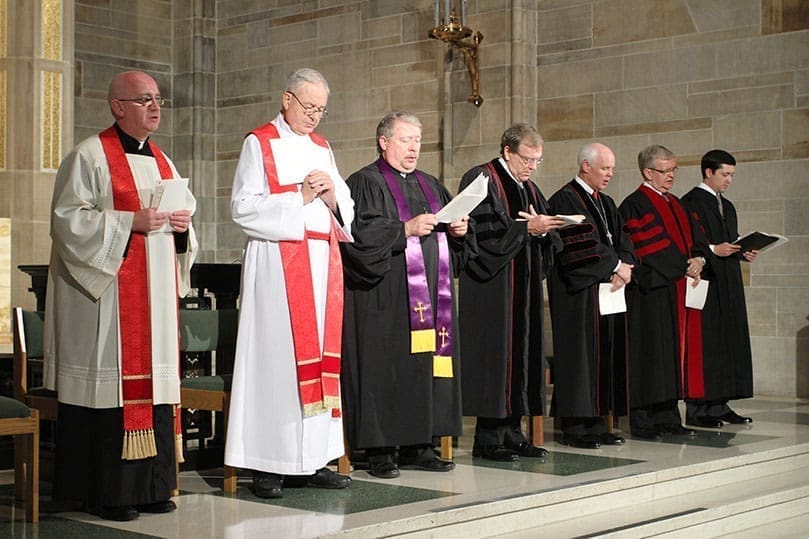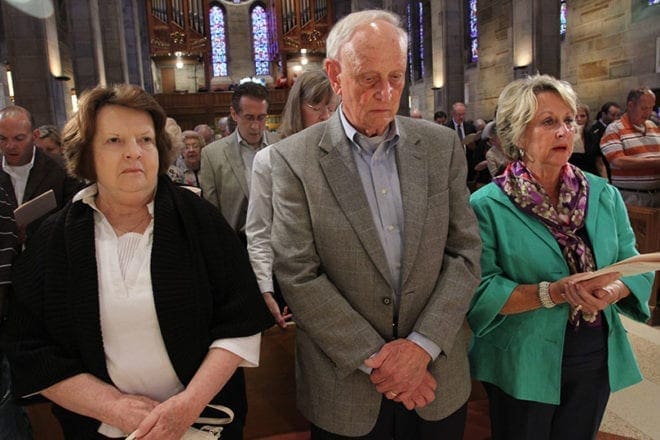 Photo By Michael Alexander
Photo By Michael Alexander
Atlanta
Christian Ministers Join Priests In Passion Reflections
By ANDREW NELSON, Staff Writer | Published April 28, 2011
A standing-room-only crowd packed the Gothic Christ the King Cathedral at noon on Good Friday to listen to seven Christian ministers reflect on the final words of Jesus.
Each of the men, dressed in different styles of vestments from their Christian traditions, spoke from the stone pulpit overlooking the audience of Protestants and Catholics in the mother church of the Archdiocese of Atlanta.
For the first time, members of the Buckhead Coalition of Churches met at the Peachtree Road Cathedral for the solemn commemoration of “The Seven Last Words of Christ,” which is a Catholic tradition during Holy Week but is not a custom for other Christian denominations.
“I have always passed the building and heard good things about it. It was very interesting and thought-provoking,” said Terry Moore, a member of Peachtree Presbyterian Church.
The audience really focused on the story of Christ in his last moments, said Moore.
Members of the different denominations saw the spiritual leaders sitting in front of a bare, stripped altar. The door of the empty tabernacle was open and the large stone crucifix behind them offered a dramatic backdrop.
People filled the pews, while others leaned against the church walls, and then the overflow crowd of men, women and families took up the seats in the adjacent multipurpose room to watch the proceedings on large screens.
“Christ’s church is more than just one denomination. His church is all over the world with believers,” said Ann Bullard, who attends Peachtree Presbyterian Church.
Most of the Christian churches wouldn’t have a service of any kind on Good Friday, but ministers were interested in the idea when he proposed it, said Father Frank McNamee, rector of the Cathedral.
“There’s very much an openness,” he said.
Father McNamee said in his two years at the Buckhead church, he’s worked to bring a Catholic presence to the ecumenical group, which is why he extended the invitation to the group.
Barbara Andrews, who worships at Peachtree Road United Methodist Church, said it was the first time in nearly 15 years she had been in the Cathedral.
“I’m just saying it was great and they should have it again,” she said.
Each of the different ministers brought their own perspectives to the reflections, she said.
“We need as Christians more oneness,” she said.
First Word: “Father, Forgive Them”
Father McNamee said that Jesus was left alone, deserted by friends and loved ones. Crowds spat on him. And when the nails were hammered into the wood, the spectators may have cheered louder.
“God’s heart broke,” he said.

Dr. David Sapp, senior pastor of Second-Ponce de Leon Baptist Church, reflects on the third word of Christ (Jesus Meets His Mother). Photo By Michael Alexander
And Jesus didn’t ask God to end his suffering, but asked God to forgive the people doing the spitting, the nailing. “As his body was dying, his heart was alive.”
Jesus’ first words were of forgiveness as a sign that “God chose to wipe away our sins,” he said. The forgiveness doesn’t come from our excuses or pleas, but because of God’s amazing mercy, he said.
And Jesus’ action “removed our sin as far as the East is from the West,” he said.
Second Word: “You Will Be With Me In Paradise”
The Rev. Vince Evans, a minister at Wieuca Road Baptist Church, talked about paradise.
The Scripture passage highlights Jesus being scorned by one of the criminals crucified with him, while the other makes a statement of faith.
In Greek, paradise translates to “garden” and Jews at that time thought of paradise as a future time, when God reappears, and as a place where righteous people went after death, he said.
But Jesus was offering paradise to a man who had committed a crime. While the exact crime is unknown, it must have been horrible for him to be sentenced to be crucified, he said. Faith—through grace—changed the criminal’s life, he said.
This change came from a relationship with Jesus, he said. It wasn’t because the criminal had the right theology, or how he lived, but “God is merciful and we have to put our faith in Jesus,” said Rev. Evans.
Jesus’ death gives those who believe in him paradise, when they will see the face and glory of God, where there is no war, no evil, no starvation and people once again are in the company of loved ones, he said.
Third Word: “Woman, There Is Your Son”
Dr. David Sapp, the senior pastor of Second-Ponce de Leon Baptist Church, said Jesus looked down from the cross and saw two people who were suffering, his mother and John, the “beloved disciple.”
They had given everything to follow Jesus and now stood broken-hearted, he said.
While dying, Jesus told them to care for each other. And there is an unverified tradition that eventually Mary and John made their home in Ephesus after Jesus made the two responsible for each other, he said.
“He also gave us to each other, sinner and saint, tall and short, Baptist, Catholic, Methodist and Presbyterian. He was giving us in care of each other until he comes again,” said Dr. Sapp.
He then invited people to turn to each other, look at each other and repeat, “Behold your brother, behold your sister, behold the family of God.”
Fourth Word: “My God, My God, Why Have You Forsaken Me?”
Dr. Bill Britt, senior minister at Peachtree Road United Methodist Church, said people try to take the sting out of a loved one’s death, with expressions like the person just fell asleep, or there was no pain.
But Jesus’ death was full of suffering and pain, he said. And these words of Jesus are haunting, he said.
Scripture states that some thought Jesus called on Elijah for help, quoting a psalm, he said. But Dr. Britt said the words show Jesus’ humanity at his suffering.
The Book of Job tells a lesson about a faithful man who suffered and how his friends wanted Job to denounce God. But Job learned the worst thing is not suffering without meaning, but suffering without God.
Dr. Britt said that Jesus cries out in anguish, but “he does say, my God.”
Just as Jesus really suffered, we can know that his redemption is real too, he said.
Fifth Word: “I Am Thirsty”
Father Richard Morrow, of the Cathedral, talked about Jesus’ thirst. After a night of trial, held in a dungeon, abused and mocked, Jesus’ mouth must have been so dry he could barely get words out, he said.
“I don’t think any one of us will suffer thirst like Jesus Christ did,” he said. “There was no Coca-Cola, no spring water, just something that must have tasted horrible—stale wine.”

(L-r) Doris and Tom Day and Carolyn Sexton, members of Peachtree Road United Methodist Church, Atlanta, stand for the singing of the song response (“What Wondrous Love”) following the third word of Christ. Photo By Michael Alexander
He suffered this thirst out of tremendous love, and we can quench the thirst today by following his example of living love “even (of) those people we can’t stand,” he said.
A way to relieve Jesus’ thirst, in a spiritual sense, can be shown in “our willingness to share, to forgive, to truly love,” he said. People will be drawn to the message of Jesus when they see his followers’ goodness in their words and actions, he said.
Sixth Word: “It Is Finished”
Matthew Sapp, a staff member of Wieuca Road Baptist Church, told a story about a businessman who suddenly is given a pink slip and fired. He wasn’t prepared: his self-image changed so fast from a success to counting himself among the unemployed. After all his hard work, he didn’t deserve to be dismissed. The man doesn’t know how to tell his family at the end of a long day, out of shame.
Then, Sapp talked about Jesus and how just a few days before, crowds were saluting him with palm branches. He had followed God’s will. Now, he carried a cross and was mocked. He didn’t deserve this. “Everything had changed so fast,” he said.
His final words were said in relief as Jesus had done all that he could do and was now handing it over to God to complete.
The message is that Jesus has shared our burdens, our disappointments.
“I know how you feel. I know what that’s like. You are not alone” is Jesus’ message, said Sapp.
Christians should “listen with Easter ears” to God’s message: “Just leave the rest to me and you won’t believe the rest.”
Seventh Word: “Father, Into Your Hands I Commend My Spirit”
Dr. Victor Pentz, senior pastor of Peachtree Presbyterian Church, told a story about a friend, whose schizophrenia at times made him suicidal. Above this man’s desk he hung a quote from a prayer written by Blessed John Henry Newman, a Catholic cardinal: “He does nothing in vain. He knows what He is about.”
Dr. Pentz said, we can pray in our lives that we may repeat Jesus’ words, “Father, into thy hands, I commend my spirit.”